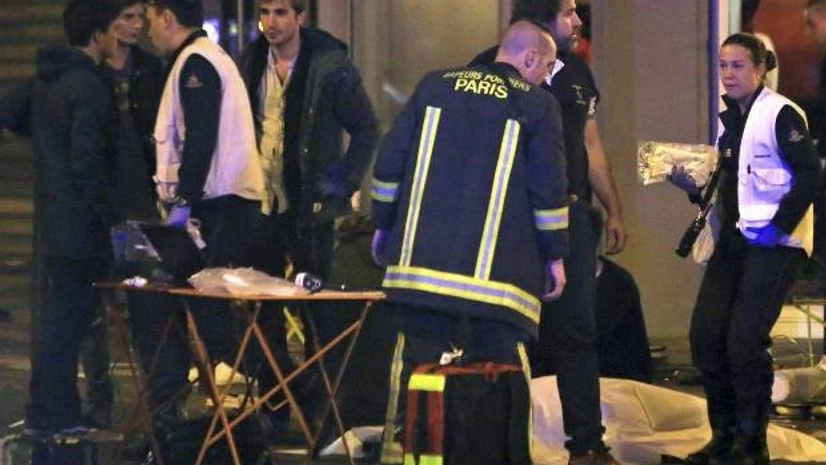It should have been a Friday night like any other in central Paris, with locals and visitors alike watching a show, enjoying a meal or shrugging off the cares of the week over a drink.
But for the second time in less than a year, France and the world are asking how carnage could strike at the heart of this much-loved city, including at a concert hall barely a few hundred steps from January's deadly attack on the satirical weekly Charlie Hebdo.
"As we went to our car we saw dozens of people running out of the Bataclan," local resident Caterina Giardino, an Italian national, said of the 19th century theatre-turned-music venue where gunman clad in black systematically killed nearly 100.
More From This Section
Witnesses at the Bataclan music venue heard the killers shout Islamic slogans and condemn France's role in the US-led coalition fighting Islamic State in Syria.
Inside the hall, California-based rock band Eagles of Death Metal were on stage promoting their fourth album when the audience began to notice something was not right.
"I turned round and I saw one of these attackers, he was very young, barely 20, with a small beard," Julien Pearce, a reporter for Europe 1 radio who was in the theatre said. "At first we thought it was part of the show, pyrotechnics or whatever. But when I turned round and saw him with his assault rifle and saw flames coming from his barrel, I understood it was no joke," he added.
As the gunman paused to reload, Pearce managed to sneak round the side of the stage and out through an exit. But witnesses described how others were not so lucky. "People were falling like dominoes," said a 22-year-old message-runner who gave his name as Toon. He had walked through the doors of the theatre just as three gunmen began shooting indiscriminately at those inside.
"One of the guys had a big hat. They were all dressed in black," he said, adding that he turned on his heels and fled.
Outside the venue, there was panic. Paris police chief Michel Cadot told local television the gunman had sprayed the terraces of several nearby cafes with bullets before entering the hall.
One witness saw a man racing down a street outside screaming "War's broken out!" A young Parisian said he and 60 others hid for an hour in the cellar of a bar on a street behind the theatre.
Emergency services were by now in full swing. Dozens of ambulances were racing to the Bataclan. Soldiers in camouflage fatigues were gathering on the nearby Bastille Square.
Shortly after midnight Paris time, a handful of loud bangs were heard coming from the theatre, not long after Hollande had issued a statement saying operations were under way to free those still in the theatre. "The police assault was extremely difficult. The terrorists who locked themselves in one of the floor had explosives belts which they detonated, and the four were killed during the assault," said Cadot.
Hollande was quick to declare a state of emergency after what he called a terrorist attack of unprecedented scale on French soil. The Interior Ministry declined to say whether there were further gunmen on the loose.
For Hollande's government, as for the French, the coming days are likely to raise as many questions as answers. If the attack was linked to France's role in Syria, why was it yet again targeted above other members of the US-led coalition?
Could the authorities, who already had the country on a heightened level of security and had promised improved surveillance after the Charlie Hebdo attacks, have done more to prevent this new assaults?
And will the French, who in January defiantly came out on the streets in their hundreds of thousands to mourn the Charlie Hebdo victims, have the courage to overcome their growing security fears and do the same a second time?
Meanwhile, Parisians woke to a city at "war". Outdoor markets in some neighbourhoods were shut Saturday, flights into the city were delayed and some landmarks, including the Eiffel Tower and Arc de Triomphe, were closed. The streets were eerily quiet for a Saturday.
The attackers targeted the eastern part of the city, away from well-known tourist sites, in the hip neighbourhood along the Canal Saint Martin and near Republique square.
The neighbourhood was for decades a diverse, working-class area dotted with metal- and woodworking shops. While it's gentrified rapidly in recent years, the diversity is still on display: near the shooting site at Casa Nostra restaurant in the 11th district, a mosque attracts men in north African garb to prayers, while 200 yards away a kosher grocery store serves the area's Orthodox Jewish community.
At least five subway stops serving the neighbourhood were shut Saturday, diverting passengers away from the area, though trains were still running.
Police officers stood watch at the sites of Friday night's attacks. The street around Casa Nostra was blocked to pedestrians and cars. Nearby, in the 10th district, passersby laid flowers outside Le Carillon bar, a block from the canal, and Le Petit Cambodge, a Cambodian restaurant across the street.
Parts of the street were cordoned off where sand had been thrown down to soak up the blood of shooting victims.
"I think that everyone has this question in mind: what is going to happen next?" said Erbibou. "How do you counter this kind of attack?"

)
